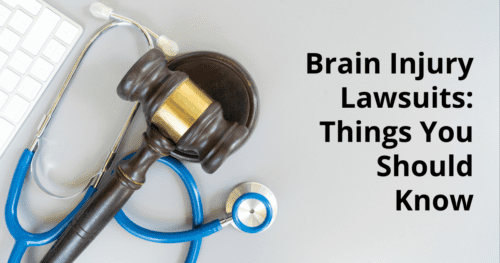Brain injury lawsuits can be complex and require specialized knowledge. This article outlines four crucial things you should know if you or a loved one has suffered a TBI in California, including the types of lawsuits, the importance of expert witnesses, the goal of compensation, and strict deadlines. Learn how GJEL Accident Attorneys can help you navigate the legal process and fight for your rights.

Brain injuries are complex, and treatment for such injuries can be expensive and long-term. Because of these factors, lawsuits involving brain injuries have distinguishing characteristics.
If you or a loved one has suffered a traumatic brain injury (TBI), you know how devastating these injuries can be. A TBI can cause long-term cognitive, emotional, and physical problems that can affect your ability to work, socialize, and live your life to the fullest. If someone else’s negligence caused your TBI, you may be entitled to compensation through a brain injury lawsuit.
At GJEL Accident Attorneys, we have extensive experience representing clients in brain injury lawsuits throughout California. Our team of brain injury lawyers understands the complex legal and medical issues involved in these cases and is dedicated to helping our clients get the compensation they deserve.
Here are four things you should know about brain injury lawsuits:
1. The type of lawsuit you bring will depend on how you sustained the brain injury.
For example, if you sustained a traumatic brain injury after a car accident, your attorney would file a negligence action on your behalf.
If you sustained your brain injury while being treated by a doctor, the proper type of lawsuit would be a medical malpractice suit. If your brain was injured because of a product, like a trampoline or an airbag, a product liability lawsuit could be the proper course of action. Different types of lawsuits have various components and must follow other rules. A qualified personal injury attorney will be able to determine what type of lawsuit will lead to a damage recovery for you.
2. A trial will likely require the use of experts
If your case goes to trial, your attorney will call many types of witnesses to prove your claim. These experts will testify to liability and/or to damages. This testimony given at trial can last for days. For example, a car accident reconstruction expert would testify that you were not at fault in the accident that inflicted your brain injury.
A medical doctor may be called to testify to how the brain injury has affected brain function and to testify to what future medical treatment you will need. An economist could be called to testify to your earning potential had you not been in an accident.
Experts will help communicate to the judge or jury how your brain injury has affected your life so far and how it will affect your life in the future. While these experts can be expensive, they are a necessary component of proving your case. An experienced attorney will have a network of experts who they can recommend to testify at your trial.
3. The goal of the lawsuit is to make an injured person whole after the accident.
Brain injuries are traumatic and can change your entire life. The purpose of a personal injury lawsuit is to put you in the place you would have been had you not been hurt in the accident. This is typically done by awarding you, and in some cases your family members, monetary damages.
4. You have a limited time to file a suit.
The number of years you have to bring a lawsuit depends on the type of lawsuit and the cause of your injuries. In general, California law limits the amount of time you have to bring a suit. In some cases, you may only have one year to file.
If you try to file a lawsuit outside the periods provided by law, the case will be dismissed. If you feel that you need an attorney and want to file a lawsuit, you must contact an attorney before this time has run.
If you or a loved one has suffered a traumatic brain injury due to someone else’s negligence, it’s crucial to seek legal representation as soon as possible. GJEL Accident Attorneys have extensive experience in handling brain injury lawsuits in California and can help you navigate the complexities of the legal process. We’re dedicated to fighting for the compensation you deserve to cover medical expenses, lost income, and pain and suffering. Don’t hesitate to contact us today for a free consultation to discuss your case and learn how we can help you seek justice and financial recovery.
Further Reading
- Brain Injury Association of America – This organization provides support, education, and advocacy for individuals with brain injuries and their families.
- Centers for Disease Control and Prevention (CDC) – This website provides information on brain injury prevention, treatment, and statistics.
- National Institute of Neurological Disorders and Stroke (NINDS) – This website provides information on the latest research and treatments for brain injuries.
Learn more about brain injuries here:
Frequently asked questions
- What is the difference between a traumatic brain injury and an acquired brain injury?
- Are brain injury victims eligible for social security payments?
- Common signs and symptoms of brain injuries
- TBI Settlement Questions
- What are the typical TBI medical expenses?
- What are the signs and symptoms of head injuries in adults?
Further Reading
- Teen brain development & safe driving
- Post-concussion syndrome
- Learn how GJEL got our client a $500,000 brain injury settlement verdict
